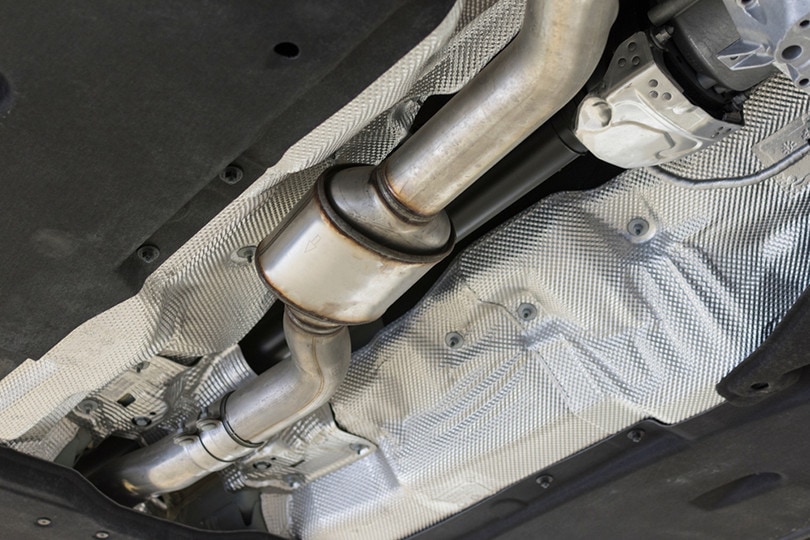Why Do People Steal Catalytic Converters? Value & Prevention
-
Shea Cummings
- Last updated:

The last time you parked your car, everything was fine. But when you started it the following day, you were met with an awful sound coming from underneath. After a quick google search, you realized that your catalytic converter was probably gone.
Catalytic converter (cat-con) theft has been happening for many years and isn’t going away. Would-be thieves love to steal cat-cons for several reasons.
First, they are easy to access; a couple of quick cuts and the part is free. Second, they contain valuable materials, and illegal chop shops will buy them without asking the thief any questions.

What is a Catalytic Converter?
A cat-con is your vehicle’s last line of defense against harmful emissions. As the exhaust passes through the system, a chemical reaction occurs between the precious metals contained in the honey-combed cat-con.
This reaction causes harmful hydrocarbons like carbon monoxide or nitrogen oxide to be converted into carbon dioxide, nitrogen, or even water vapor. So, they are absolutely necessary for a vehicle to meet the emissions standards it was manufactured with.

Why are They Valuable
The value of a cat-con comes from the three precious metals they contain: platinum, palladium, and rhodium. There isn’t a ton of these materials in one cat-con but seeing the market value of these metals puts it into perspective.
- Platinum: $925 per ounce
- Palladium: $2,219 per ounce
- Rhodium: $5,000 per ounce
Like any precious metal, the price is constantly going up and down. However, the above prices pulled from metals daily have been stable for a while, so the extreme value of these metals—even in small amounts—demonstrates why thieves love to steal cat-cons.
How to Prevent Catalytic Converter Theft
Cat-con theft is not only inconvenient and annoying, but it can be an expensive fix. Depending on the vehicle, it can cost several thousand dollars to replace the cat-con. If you only have liability coverage on your insurance instead of comprehensive, you’ll likely have to pay out of pocket.
You can take a few steps to prevent or even discourage your vehicle from being targeted for cat-con theft.
- Etching your vehicle identification number (VIN) or plate number onto the cat-con could help recover the part if stolen. But if you do it in an obvious spot, it may discourage a potential thief from stealing it in the first place.
- If you can, park in a garage or a secure, well-lit location.
- Many vehicles are equipped with an alarm. If yours isn’t, then installing one that’s calibrated to sense vibration will be a deterrent for a thief if they start messing around under your car.
- Because a thief needs to get under your car, they might not bother attempting it if you park in a way that makes this difficult.
- Purchasing and installing a Cat Clamp is a great way to protect your vehicle’s cat-con. This is effective because many thieves target cat-cons because they are quick and easy to get off. Installing a Cat Clamp will make it significantly more difficult for them to get the cat-con out and will likely discourage the thief.

Conclusion
The cat-con is not a part of our vehicle that we see very often—if ever. So, it pays to know what it is and why a thief may attempt to steal it. If you haven’t already been a victim of this particular theft, hopefully, we’ve provided some valuable tips to help prevent it from happening.
However, there is no way to 100% prevent cat-con theft from happening. All we can do is make it as difficult as possible for would-be thieves in hopes of discouraging them from carrying out the theft.
- https://www.nj.com/news/2021/09/why-are-people-stealing-catalytic-converters-how-do-you-stop-them-heres-what-to-know.html
- https://www.metromile.com/blog/why-do-thieves-steal-catalytic-converters/
- https://www.cars.com/articles/whats-a-catalytic-converter-and-why-do-people-steal-them-446861/
- https://www.cbc.ca/news/canada/calgary/catalytic-converter-alberta-stolen
- https://www.metalsdaily.com/
Featured Image Credit: Ulianenko Dmitrii, Pixabay
Contents

